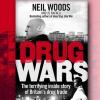04/16/24 Rusty White 1Hour
Rusty White became a top K-9 narcotics dog trainer, Track and Attack K-9 trainer and handler, and served as the sniper for the Department of Corrections. White also worked for 7 years as a corrections officer in an maximum security prison in Arizona. White started to question the way the War on Drugs was being fought. He questioned the arrests of low-level dealers when all of the promises were about kingpins. He watched with confusion and dismay as child molesters and other violent criminals were released from prison to make room for an ever-growing population of non-violent drug offenders.



















































